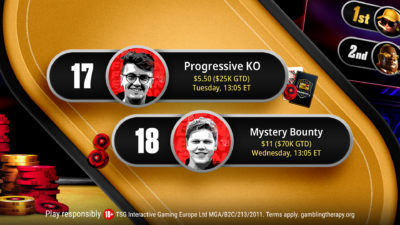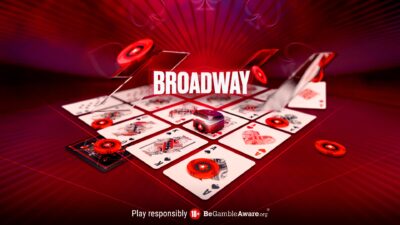We’re lucky enough to be able to watch a lot of poker, and more so to see it first hand and close up while reporting from live events like the PokerStars Caribbean Adventure, which finished last week.
Watching from just a few feet away you see everything: the good plays, the questionable plays, the unforgettable plays, and from everyone from experts to amateurs. I’d like to say it’s easy to learn something, but that’s not always the case. But you tend to come away with something – resolutions you might call them – particularly at the PCA which comes in the middle of resolution season. It might be to study more, play more, or simply to play better. Whatever it is there’s a will to improve.
On that point Team PokerStars Pros have been in similar mood, looking ahead to 2016, but also thinking over what steps you can take to become a better player. There’s no trick, and no one piece of advice that will suit all. But we think what follows will help every player, regardless of ability.
We’ve already featured the thoughts of players like Mickey Petersen, Caio Pessagno and Lex Veldhuis, now is the turn of five more. We asked the same questions that we asked last time around. They were:
1) What goals would you suggest for a beginning player?
2) What goals to set yourself in order to grind a long tournament or poker session?
3) Thinking back to when you started playing poker, what goals do you think led you to becoming pro?
4) What percentage do you feel a beginning player should be playing poker compared to studying poker?
5) What should we avoid when setting our goals so that we have a realistic chance of achieving them?
From such a broad range of players we got a great mix of answers, so there’s something to take from each player’s perspective, whether you use it at the PCA or in your local home game. Here’s what they had to say.
Tyler “frosty012” Frost
Started playing in 2010


I would suggest that a beginning player sets a goal of winning at the smallest stakes available in their preferred format and then moving up stakes once they are winning on a regular basis. It’s important to start at the bottom and get a feel for how the games are played and hone your skills with similar competition…moving up so that players “respect your raises” may not actually yield the best results for you!
2. What goals to set yourself in order to grind a long tournament or poker session?
My main goal while playing a cash game session is usually to simply play a certain amount of hands. In order to accomplish this, I’ll do things like not checking my results while I play so that I don’t get too frustrated or complacent with the short term variance. I think that it’s important to focus on the things you can control, rather than set a profit goal for example…I wouldn’t recommend the latter because great play does not always guarantee great results. I also like to eat before I play a session so that I’m not interrupted by hunger!
3. Thinking back to when you started playing poker, what goals do you think led you to becoming pro?
I think that the main goal of mine that led to me becoming a pro was the goal of being able to play a specific number of hands per month. I think that treating poker like a job and setting a working schedule for yourself can play an important role in finding success as a pro. Also, once I was able to routinely play a certain number of hours or hands per day and tried to take the focus off of the results, I became more comfortable with the variance that accompanies the profession.
4. What percentage do you feel a beginning player should be playing poker compared to studying poker?
I think that I would recommend somewhere around 70% playing and 30% studying. I did most of my learning at the tables, where you can really start to get a sense for what works and what doesn’t. That said, there are a lot of resources out there that can range from simply helping you build solid poker fundamentals to taking your game to the next level and I do think it’s also important to put in the time away from the tables to improve.
5. What should we avoid when setting our goals so that we have a realistic chance of achieving them?
When setting our main goals, it’s important to also set smaller goals that can ultimately help us accomplish our main goal. For example, if what we really want is to move up in stakes, we could set a goal of studying poker for two hours a day to help us get better and indeed make it possible to move up stakes successfully. We want to avoid setting one giant unrealistic goal with no tangible plan of how to reach it.
Naoya “nkeyno” Kihara
Started playing in 2007


First of all, enjoy the game! Second, enjoy the game! Third, enjoy the game! If you still think poker is fun, then you automatically have interest in learning poker also.
2. What goals to set yourself in order to grind a long tournament or poker session?
When playing tournaments always feel happy. If I win first place, I want to feel it again and again.
3. Thinking back to when you started playing poker, what goals do you think led you to becoming pro?
I just felt so much fun and excitement playing poker. I just wanted to keep playing.
4. What percentage do you feel a beginning player should be playing poker compared to studying poker?
100% playing, 0% studying.
5. What should we avoid when setting our goals so that we have a realistic chance of achieving them?
You should avoid making the goal of making money. We can win money as a result, but you should think money is just the result of the game. Enjoying the game is the most important thing!
To get started on your own poker career click here to get a PokerStars account.
Grzegorz “DaWarsaw” Mikielewicz
Started playing in 2004


For beginning players I would suggest the goal of accepting the specifics of poker, and not giving in to potential tilt. Only when you take care of that can you fully employ a good poker strategy, and become a winning player.
2. What goals to set yourself in order to grind a long tournament or poker session?
I don’t set short term goals. My goal for any given session or tournament is to undertake correct (in terms of my strategy) decisions in every hand i play.
3. Thinking back to when you started playing poker, what goals do you think led you to becoming pro?
I wanted to understand game enough to be aware of what and why I am doing at the tables.
4. What percentage do you feel a beginning player should be playing poker compared to studying poker?
I think anywhere between 25% and 50% of studying will be good.
5. What should we avoid when setting our goals so that we have a realistic chance of achieving them?
Don’t set goals that are way over your current achievements/scores. You should actually downgrade them a little bit to make sure they are realistic. For example if you play 10,000 hands a month and want to make yearlong goal, assume you will play 9,000 each month.
If you have ROI of 15% over one month, assume you want 10% over year. If you will get it done, then you can go a bit higher.
Mikhail “innerpsy” Shalamov
Started playing in 2007


I think it’s important to set an exact goal in terms of effort spent, not results. It’s also important to figure out a point where you re-evaluate how things are going and maybe have your plans changed.
2. What goals to set yourself in order to grind a long tournament or poker session?
The only goal you can have when you sit down to play is play you’re A game, and be able to quit when you feel like you are not.
3. Thinking back to when you started playing poker, what goals do you think led you to becoming pro?
I always wanted to reach outside my comfort zone. My whole plan was to reach the level where I’m not a winner, then move down a bit and grind. And on the way to accomplishing that I set myself some short term goals, like “become better at big blind defence,” etc.
4. What percentage do you feel a beginning player should be playing poker compared to studying poker?
I think first it should be at least equal time, if not even 2:1 ratio. Theory is really important all the way, especially at the start.
5. What should we avoid when setting our goals so that we have a realistic chance of achieving them?
I wouldn’t set result oriented goals. That way it doesn’t lead you to frustration when you actually play good. Goals should be something that you definitely able to achieve if you try hard.
Adrienne “talonchick” Rowsome
Started playing in 2002


To be able to identify at least three mistakes you made while playing and consider what other play you could have made. These mistakes can even be in hands where you won a pot – look for mistakes without considering the result first.
2. What goals to set yourself in order to grind a long tournament or poker session?
My goals are to be mindful – to be self-aware and realize if I have over extended myself or am not playing as well as I could. I want to be as attentive in hand one as in hand 600
3. Thinking back to when you started playing poker, what goals do you think led you to becoming pro?
Lifestyle goals – while I enjoy my career as an Occupational Therapist, I loved the freedom of being my own boss – even though sometimes that means I will put in an 80 hour work week. Flexibility and comfort are both very important to me.
4. What percentage do you feel a beginning player should be playing poker compared to studying poker?
This depends on your goal – if you’re there to have fun, win a hand or two and not really worried about the outcomes/playing their best, I don’t want to suggest you should spend any amount of time studying. For some people, winning overall doesn’t matter.
If financial returns are the reason you are playing poker, I would suggest that you spend near equal time playing/studying. You can spend time reviewing hands in your sessions and also then spend time finding tools online to help you improve your game.
5. What should we avoid when setting our goals so that we have a realistic chance of achieving them?
Be certain that your goals are in your realm of control. Don’t set a goal like “I want to win with aces every time” – it would be nice, but it just doesn’t happen.
Be aware of your own abilities and start small – the littlest goals snowball into some extreme successes.
Set poker goals about playing, but also about different things you want to do away from the tables, be it meditation, reading, days off, etc.
Ready to sign up for PokerStars? Click here to get an account.
You can set your own poker goals for 2016, and receive expert tuition to help achieve them at PokerSchoolOnline. You’ll find all sorts of resources, from videos, tips, and general advice that will help you improve your game whatever level you play. Go to the PokerSchoolOnline homepage for all the details.
This is the second of three articles about setting your own poker goals for 2016. The final part will be on the PokerStars Blog next week. You can read the first part here.
Stephen Bartley is a staff writer for the PokerStars Blog.
Back to Top






